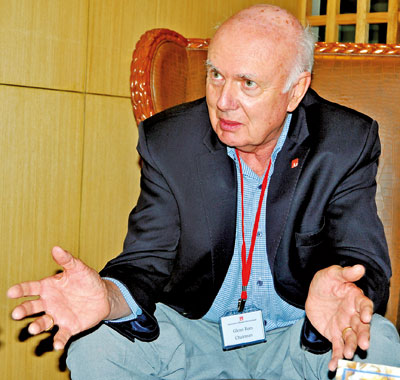Help dementia patients live life as best as they can
Ageing is an undeniable truth of life, bringing about many changes in a person. Many of these changes are positive, such as amassing a wealth of experiences and knowledge. But it can also mean declining health, and a particular vulnerability to memory loss and cognitive issues that are serious enough to interfere with daily life.

Glenn Rees in Colombo
Dementia itself is not new, and yet, very little has been known about it for centuries. Alzheimer’s is the most common cause of it, and the greatest known risk factor is ageing, but it must be stressed that it is not a normal part of ageing. A very important point to make, according to chairman of Alzheimer’s Disease International Glenn Rees, is that it is a social disease as well as a chronic medical one. Without the involvement of social agencies as well as medical agencies in dementia, there is a slim chance of success in dealing with it.
“People live with dementia 24 hours a day, 7 days a week. You’ll hear them say ‘I have no purpose in life’ and that makes me very sad, so what can you do about that? You can try and help them continue their activities in the community,” he explains.
Glenn was in Sri Lanka as a speaker at the 21st Asia Pacific Regional Meeting for Alzheimer’s Disease International in November where leading figures in the field of dementia and Alzheimer’s gathered to promote awareness and erase stigma. The meeting was hosted this year by the Lanka Alzheimer’s Foundation.
The focus of the meeting was the World Health Organisation (WHO) Global Dementia Action Plan, to recognise the economic and social impact of dementia and on health and long-term care systems globally. Adopted in May 2017 by all members of WHO, the Plan requires that 75% of countries will have adopted or updated their national dementia plans by 2025.
Priority areas of the plan include collaboration with government on public health response to dementia, safeguarding human rights, empowering people with dementia and carers, evidence-based risk reduction, universal health and social care coverage, equity and awareness for prevention, cure and care.
Glenn has been involved in aged care and dementia since 1985 when he was asked by the Australian government to review the country’s balance of aged care provision. A former CEO of Alzheimer’s Australia, his work spanned from developing ideas despite the complete lack of intellectual capital, to implementing, learning and advocating at a high level.
“The view of Alzheimer’s Disease International is that National Dementia Plans are essential,” Glenn adds. “First, it makes awareness of dementia and increases its profile. Secondly, you want to show all the action that’s interconnected across a range of programmes.”He believes that if you want real change in dementia, you have to get backing from political leadership.
“Unless you have somebody providing political leadership that pulls people together, you won’t succeed. You also want the community and government to be interested in how to get people to continue with their everyday lives as best they can, and to have their human rights protected,” he explains.He adds that he felt “quite positive about what the mental health system in Sri Lanka looks like” and that from his brief experience and meeting with the Ministry of Health that “there’s something to build on in the mental health area.”
Another vital aspect of a good national dementia plan is risk production, with evidence linking dementia with chronic diseases like diabetes, heart disease and obesity. Physical activity to help avoid or slow the process, coupled with mental and social activity, is currently the best chance of reducing the risk of dementia and in cost-effective ways.
“So all the things that make sense to you, you should be doing.”
While we have a long way to go, the development of a plan that considers the consumer perspective of people with dementia and family carers– who do most of the work – is essential. The concept of a dementia-friendly society is based on the simple idea of reducing barriers to help people with dementia feel engaged with the community and reduce the rampant issue of social isolation.
From innovative concepts like the 250-300 ‘memory cafes’ in the Netherlands where people with dementia and the community meet and quite often people with dementia work, to simple design principles and colour schemes for dementia-friendly buildings – the fundamental principle is to help people with dementia have control over their daily lives.
Training people to help people with dementia is arguably the most vital aspect however, and Glenn stresses the importance of training for staff of services like banks and hospital as well as emergency services, so that they understand dementia and people with cognitive issues aren’t made to feel silly.
Concepts like buddy systems, training videos, ID bracelets, return home systems for people who are lost, and trained support animals are not revolutionary. They already exist, and can be adapted to any culture.
“It’s not a bureaucratic programme with guidelines,” Glenn says of the plans. “The only thing important about it is the fundamental principle of ensuring that people with dementia have their human rights respected and ensure that they have absolute freedom in terms of access to legal services, information, and continuing activities of various kinds so they can participate in the community.”
| Worrying statistics According to research by Alzheimer’s Disease International, there are around 50 million people living with dementia worldwide, with a projected rise of 150 million by 2050 due to the lack of a cure. The cost of dementia both direct and indirect is already at the 1 trillion USD mark, with a projected rise to 2 trillion by 2030. It is a shockingly costly and disabling disease, particularly when considering that 68% of people with dementia live in low to middle income classes. Developing countries, particularly South Asia, also have the fastest growing elderly population. | |


